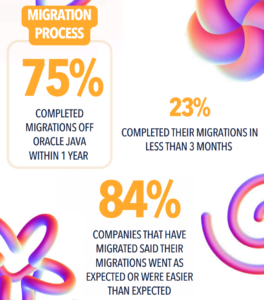
The secret’s out. Search the internet, and you will see over and over again that Java migration from Oracle Java to OpenJDK is usually pretty simple if you’re not using very old Java versions or older, deprecated desktop technologies. It makes sense since TCK-tested OpenJDK distributions are identical to the code Oracle releases. Companies are flocking from Oracle Java to OpenJDK alternatives to escape Oracle’s high prices, especially for its employee-based pricing model, which is expanding throughout its subscriber base.
So Azul Deputy CTO Simon Ritter was confirming accepted fact when he wrote in OpenJDK Migration for Dummies, “Migrating to certified builds of OpenJDK can be very straightforward and simple for the vast majority of enterprises. If you’re migrating server applications, you’re not likely to encounter any challenges.”
The key, according to the book and other sources, is to do your homework. Make an inventory of all your applications that use Java because if you leave a Java-based application in your estate, you will have to pay based on your employee count, not on the amount of Java in your estate, which frequently gets very expensive. Under the new model, your business would have to pay based on the number of employees – including part-time workers and contractors – rather than the Java they use or the named users in your organization. Most organizations under the new model saw their Java bills go up 2x, 5x, even more.
Migrating to certified builds of OpenJDK can be very straightforward and simple for the vast majority of enterprises. If you’re migrating server applications, you’re not likely to encounter any challenges.
OpenJDK Migration for Dummies
Why aren’t more Oracle Java users moving to OpenJDK?
Let’s not kid ourselves; Oracle Java subscribers are moving to OpenJDK distributions in droves. In Azul’s Oracle Usage, Pricing & Migration Survey and Report (2024), 86% of respondents had already migrated to non-Oracle alternatives or expected to complete their migrations soon.

Most of those who planned to migrate but hadn’t started yet planned to start within the next two years. What about the 14% of participants who planned to continue with Oracle Java? Just over a third (35%) were happy with Oracle prices, but many more felt stuck because they didn’t know if they could migrate successfully.
This is where the 25% that had already completed their migrations come in. Despite trepidation among Oracle Java users to move to an OpenJDK distribution, most organizations that have undertaken a migration have been pleased with the process and result. 90% of respondents who completed their migrations to OpenJDK did so within two years, 75% within 12 months, and 23% in less than three months.
So migrations are fast. But are they easy? According to survey participants, yes. 41% indicated that the migration was easier than they expected, and the remaining 43% said it went as planned.
As OpenJDK Migration for Dummies says, “There are just a few potential issues, typically involving older, deprecated desktop technologies.” These typically very old versions of Java or Java-specific features include Applets, JavaFX, or Java Web Start.
Make your OpenJDK migration easy
If Oracle Java prices have you seeking an alternative Java provider, take care of the fundamentals first:
- Align on the goals of your Java migration
- Perform a thorough audit of your Oracle estate so you don’t leave a Java application or library behind that can still be billed on a per-employee rate
- Address any potential problems like old Java versions or deprecated Java features
- Execute your migration
- Test everything





